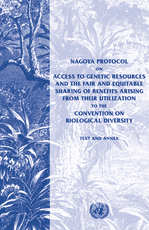Nagoya Protocol on Access and Benefit-Sharing
The Nagoya Protocol on Access to Genetic Resources and the Fair and Equitable Sharing of Benefits Arising from their Utilization to the Convention on Biological Diversity governs the distribution of benefits (financial earnings, academic credit, etc.) from discoveries made using genetic resources. Under the Nagoya Protocol, states parties are required to provide prior informed consent when taking genetic resources from another country, and to negotiate Mutually Agreed Terms (MATs) on the benefits that may be accrued from research and development performed using those resources. The Nagoya Protocol does not specifically include pathogens (e.g., bacteria, viruses), which has created some controversy over efforts to negotiate MATs related to medical countermeasure development.
States parties are required to enact domestic access and benefit sharing legislation for genetic resources.
| Opened for signature | 29 Oct 2010 |
| Entered into force | 12 Oct 2014 |
| Latest update | 29 Oct 2010 |
| Available languages |
Related treaties
Related topic
States parties
Countries automatically become a party to the Nagoya Protocol 90 days after depositing their instrument of ratification, acceptance, approval or accession. Download the data in this table to view any reservations, understandings, and declarations (RUDs).
Country | Status | Signed | Ratified | Entered into force |
|---|---|---|---|---|
| Afghanistan | Party | 6 Jun 2018 | 4 Sep 2018 | |
| Albania | Party | 29 Jan 2013 | 12 Oct 2014 | |
| Algeria | Signatory | 2 Feb 2011 | ||
| Andorra | Non-party | |||
| Angola | Party | 6 Feb 2017 | 7 May 2017 | |
| Antigua and Barbuda | Party | 28 Jul 2011 | 12 Dec 2016 | 12 Mar 2017 |
| Argentina | Party | 15 Nov 2011 | 9 Dec 2016 | 9 Mar 2017 |
| Armenia | Non-party | |||
| Australia | Signatory | 20 Jan 2012 | ||
| Austria | Party | 23 Jun 2011 | 20 Jul 2018 | 18 Oct 2018 |
Party
The state has accepted, approved, ratified, or is otherwise party to the agreement, indicating consent to be bound to the agreement.
Signatory
The state has signed, but not yet ratified or become an official party to the agreement. Where the signature is subject to ratification, acceptance or approval, the signature does not establish the consent to be bound. However, it is a means of authentication and expresses the willingness of the signatory state to continue the treaty-making process. The signature qualifies the signatory state to proceed to ratification, acceptance or approval. It also creates an obligation to refrain, in good faith, from acts that would defeat the object and the purpose of the agreement.
Non-party
The state has not taken any actions with regard to the agreement.
Associate member
The state may have requirements for some of the statutory or non statutory aspects of an agreement, but would not confer all of the obligations of the agreement on the member. Associate members may not have voting rights.
Observer
The state is non-party to an agreement, but has the ability to attend meetings or other discussions, and otherwise participate in activities. Observers may be granted permission to speak at formal meetings.




